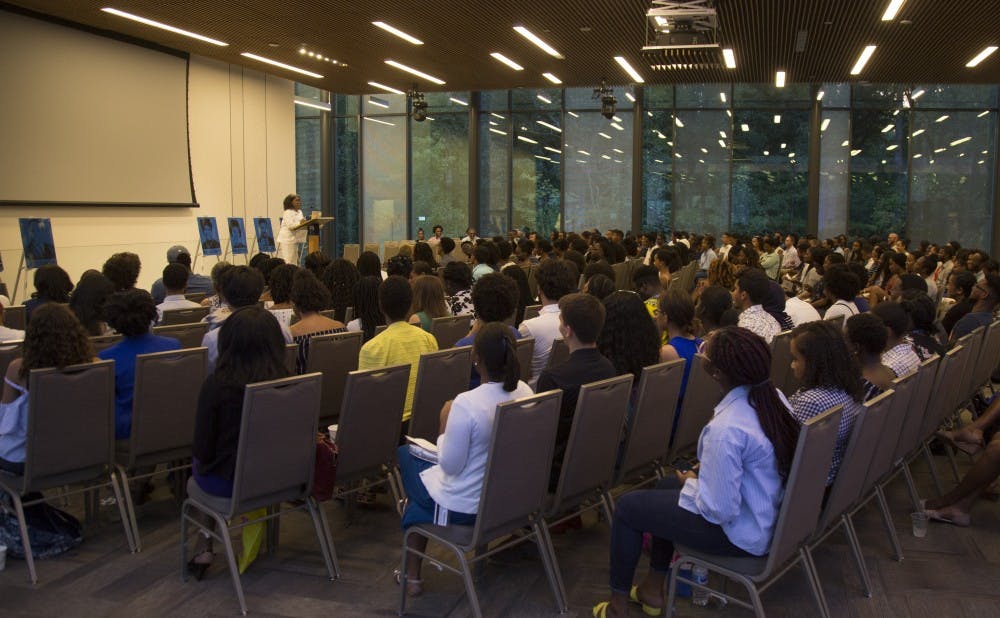At Tuesday’s Black Convocation, members of the Black community built unity at Duke and expressed hope regarding the response of "resistance" to the recent defacement of Duke's black culture center.
Undergraduates, graduate students, faculty, staff and alumni filled Penn Pavilion in attendance of the fourth annual convocation, seeing speakers expressing messages of unity, among other things.
Ben Reese, vice president for institutional equity, also gave a speech in remembrance of Phail Wynn, who was vice president of Durham and regional affairs for 10 years. He died in July shortly after retiring.
After a sign at the Mary Lou Williams Center for Black Culture was defaced with a racial slur two days before classes began, junior Kennedy Ware, president of the Black Students Alliance, was hopeful about some of the pushback to the incident she saw.
“A lot of the initial reactions that I have heard thus far have been of pain, frustration, confusion and fear,” Ware said. “It is in this moment that the response that has given me the most hope is that of resistance.”
Ware said resistance could be anything from taking a group photo unbothered in front of the Chapel to speaking up when others attempt to silence one's perspective.
"Resistance is demanding spaces for black culture and black art," Ware said. "Resistance is joyfully walking across the quad. Resistance is solidarity.”
Chandra Guinn, director of the Mary Lou Williams Center for Black Culture, traced back the origin of the Black Convocation to four years ago, in 2015. At that time, she said, it “seemed like we needed to get together in protest.” She said that the black community realized they had to do something different. Just a few months before, a noose was found hanging on the Bryan Center Plaza.
Although she rhetorically asked the audience if they had ever felt as if there were no other blacks who work at Duke, she noted that there are approximately 750 undergraduates, 700 graduate students and more than 300 faculty members who identify as those of the African diaspora. Thus, Guinn said the role of black convocation is “celebrating being black at Duke.”
Melanie Walker, Law School ’19 and president of Black Graduate and Professional Student Association, reflected on the positive contributions to her time at the Law School. Ranging from her experiences in student organizations such as her involvement in Black Students Law Association, the Mary Lou Williams Center and BGPSA, to her experiences in the Raleigh/Durham area, she emphasized in her speech how important it is for students to not “forget to occasionally step outside the Duke bubble.”
Ware mentioned similar feelings of community on campus, such as when she greets "Big Mike" when she gets on the bus or when sees “a plethora of beautiful black faces” when walking around campus. She also described the “warm energy” she feels when studying and relaxing in the Mary Lou Center, as she is “instantly reminded of the love and support and excellence” that surround her on campus.
Yet, the past two weeks has tested that sense of community, in light of the defaced sign at the Mary Lou Williams Center.
Making her first public statement on the incident, Guinn remarked that she wanted to let everyone know that “we are fine; we are good and your presence here tonight makes us even better.”
“In terms of hard truths–really and truly when folks would ask me if I needed anything or how I felt–what I said was that we are moving forward with a hopeful heart,” Guinn said. “Because the truth is as long as we stay in hope, hate can’t win.”
In Reese’s remembrance of Wynn, he referred to Wynn’s diverging contributions to the Durham and Duke communities, including his ten-year tenure as vice president of the office of Durham and regional affairs and being the first black president of a community college in North Carolina. He also mentioned that a multitude of places in Durham are named after him but intentionally did not name any specific ones.
“Part of your challenge and part of your homework is–over the years that you are here–that you find out what he has done and what places are named after him,” Reese said. “They named places after him because they know that not only he set foot in those places but he transformed those places.”
Ashlie Tyler, Trinity '10 and a first-year M.B.A. student at the Fuqua School of Business, spoke on how humbled she is on the growth of the Black community in the eight years since she graduated.
“There are so many more resources for students, yet still not enough,” Tyler said. “Tonight’s message–that we belong and that we are enough was necessary, especially for the undergraduates who are coming of themselves in this world.”
She furthered that she would “press upon the University to continue to pour into [the black community] and [the black community] into each other.”
“As Chandra mentioned, we have to be the community that we say that we want, and we absolutely have that power,” Tyler said.
Correction: This article originally misstated the name of Black Students Alliance, calling it the Black Students Association. The article was updated Wednesday morning to correct that. The Chronicle regrets the error.
Get The Chronicle straight to your inbox
Signup for our weekly newsletter. Cancel at any time.

Stefanie Pousoulides is The Chronicle's Investigations Editor. A senior from Akron, Ohio, Stefanie is double majoring in political science and international comparative studies and serves as a Senior Editor of The Muse Magazine, Duke's feminist magazine. She is also a former co-Editor-in-Chief of The Muse Magazine and a former reporting intern at PolitiFact in Washington, D.C.

